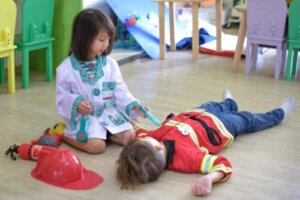8 Benefits of Role-Playing Games at School


Written and verified by the teacher Samanta Ruiz
Role-playing is a type of game in which children simulate real-life situations. If you’re a teacher, then surely you’ve organized them at school. But do you know what the main benefits of role-playing games at school are?
In an article published in the newspaper El País, Raúl Santiago Campión, professor of Didactics at the University of La Rioja, explains that role-playing “encourages inquiry and stimulates creativity, by simulating real-life situations where, many times, they must practice spontaneous problem solving“. He also describes the advantages of finding spaces at school to develop them, given their many benefits for children.
Allow us to tell you more!
“Well-planned and directed role-playing games stimulate, educate, and allow the exercise of faculties that in real life are limited or oppressed by the environment and circumstances. The practice of role-playing games often provides learning, skill, and a legitimate escape very similar to happiness”
– Arturo Pérez Reverte –
Learn about the benefits of role-playing games
From birth, children go through several stages in the development of play. In the first two years, play activities are focused on emotional development and the establishment of positive bonds. Only after 24 months, play takes on a symbolic component, and little ones begin to imitate adults and play roles.
At school, with the teacher as a guide, children begin to participate in role-playing games from the preschool level. They can even do it up through high school because these activities have the virtue of being adaptable according to the age of the children. In addition, they’re dynamic and entertaining and provide children with the following benefits:

1. Promote learning about the world around them
Role-playing games allow children to simulate daily life situations and understand how others live their daily lives. For example, they can imitate what mom does at home, how she prepares the food, and, in this way, children can understand how much work housework involves.
2. They make it possible to process situations that worry them
Imitating a real situation with a game makes it possible for children to anticipate a moment that worries them, frightens them, or is unfamiliar to them. For example, something very frequent and sometimes stressful for children is going to get a vaccination. But, if they practice the situation through play, it’ll already be something familiar and won’t generate so much anxiety or fear.
3. They develop social thinking and emotional intelligence
When children participate in imitation games, they have to communicate, negotiate, share ideas, and carry out plans in a consensual way. This way, they learn to develop social skills and to think in groups.
In this exchange, children begin to recognize their emotions, interpret gestures, and carry on conversations with respect for each other’s place and time.
4. Role-playing games stimulate creativity and imagination
In role-playing games, the teacher only establishes the guidelines for the game and some rules. But the protagonists are the children and the action of the story depends on their imagination and creativity.
5. They teach the decision-making process
Even though it’s the representation of a fictitious story, the decision-making process is activated with these games. Children learn to evaluate risks and choose to take one path or another. In this way, they must accept the consequences of their own decisions.
6. They support the development of the power to synthesize
Role-playing makes it possible to connect skills and knowledge in higher-level synthesized learning. For example, when children pretend to shop, they use their knowledge to add up prices and their social skills to agree with their peers on what to buy. In this way, children synthesize all they’ve learned in a single action.

7. They encourage teamwork
Like all collaborative activities, role-playing games require teamwork to move forward, solve a problem, or make a decision. Working together to achieve a goal teaches children to discuss, talk, and understand that the effort is much more bearable if it’s shared.
8. Role-playing proposes experiences and invites reflection
Role-playing can bring new and mobilizing experiences to the classroom. For example, in a fictitious situation, you can represent what happens to a person who steals. Consequently, this can be a trigger to reflect on freedom and other values in a society.
How to organize role-playing games and take advantage of the benefits of play
Implementing role-playing at school requires prior planning. The teacher has to create the rules, present a situation, and define the objectives of the activity and what’s going to be evaluated with it. For example, role-playing is an excellent strategy and can be organized at any educational level.
For younger children, it can be the representation of a family situation, such as simulating how a mother cooks. Older children, on the other hand, can act out a scene about the decisions a historical figure must make. In short, role-playing games stimulate creativity and the approach of more active learning strategies that transfer the protagonism to children and provide them with many benefits.
Role-playing is a type of game in which children simulate real-life situations. If you’re a teacher, then surely you’ve organized them at school. But do you know what the main benefits of role-playing games at school are?
In an article published in the newspaper El País, Raúl Santiago Campión, professor of Didactics at the University of La Rioja, explains that role-playing “encourages inquiry and stimulates creativity, by simulating real-life situations where, many times, they must practice spontaneous problem solving“. He also describes the advantages of finding spaces at school to develop them, given their many benefits for children.
Allow us to tell you more!
“Well-planned and directed role-playing games stimulate, educate, and allow the exercise of faculties that in real life are limited or oppressed by the environment and circumstances. The practice of role-playing games often provides learning, skill, and a legitimate escape very similar to happiness”
– Arturo Pérez Reverte –
Learn about the benefits of role-playing games
From birth, children go through several stages in the development of play. In the first two years, play activities are focused on emotional development and the establishment of positive bonds. Only after 24 months, play takes on a symbolic component, and little ones begin to imitate adults and play roles.
At school, with the teacher as a guide, children begin to participate in role-playing games from the preschool level. They can even do it up through high school because these activities have the virtue of being adaptable according to the age of the children. In addition, they’re dynamic and entertaining and provide children with the following benefits:

1. Promote learning about the world around them
Role-playing games allow children to simulate daily life situations and understand how others live their daily lives. For example, they can imitate what mom does at home, how she prepares the food, and, in this way, children can understand how much work housework involves.
2. They make it possible to process situations that worry them
Imitating a real situation with a game makes it possible for children to anticipate a moment that worries them, frightens them, or is unfamiliar to them. For example, something very frequent and sometimes stressful for children is going to get a vaccination. But, if they practice the situation through play, it’ll already be something familiar and won’t generate so much anxiety or fear.
3. They develop social thinking and emotional intelligence
When children participate in imitation games, they have to communicate, negotiate, share ideas, and carry out plans in a consensual way. This way, they learn to develop social skills and to think in groups.
In this exchange, children begin to recognize their emotions, interpret gestures, and carry on conversations with respect for each other’s place and time.
4. Role-playing games stimulate creativity and imagination
In role-playing games, the teacher only establishes the guidelines for the game and some rules. But the protagonists are the children and the action of the story depends on their imagination and creativity.
5. They teach the decision-making process
Even though it’s the representation of a fictitious story, the decision-making process is activated with these games. Children learn to evaluate risks and choose to take one path or another. In this way, they must accept the consequences of their own decisions.
6. They support the development of the power to synthesize
Role-playing makes it possible to connect skills and knowledge in higher-level synthesized learning. For example, when children pretend to shop, they use their knowledge to add up prices and their social skills to agree with their peers on what to buy. In this way, children synthesize all they’ve learned in a single action.

7. They encourage teamwork
Like all collaborative activities, role-playing games require teamwork to move forward, solve a problem, or make a decision. Working together to achieve a goal teaches children to discuss, talk, and understand that the effort is much more bearable if it’s shared.
8. Role-playing proposes experiences and invites reflection
Role-playing can bring new and mobilizing experiences to the classroom. For example, in a fictitious situation, you can represent what happens to a person who steals. Consequently, this can be a trigger to reflect on freedom and other values in a society.
How to organize role-playing games and take advantage of the benefits of play
Implementing role-playing at school requires prior planning. The teacher has to create the rules, present a situation, and define the objectives of the activity and what’s going to be evaluated with it. For example, role-playing is an excellent strategy and can be organized at any educational level.
For younger children, it can be the representation of a family situation, such as simulating how a mother cooks. Older children, on the other hand, can act out a scene about the decisions a historical figure must make. In short, role-playing games stimulate creativity and the approach of more active learning strategies that transfer the protagonism to children and provide them with many benefits.
All cited sources were thoroughly reviewed by our team to ensure their quality, reliability, currency, and validity. The bibliography of this article was considered reliable and of academic or scientific accuracy.
- Camarero, A. (2022, October 22). Cuando el alumno sube a escena: los beneficios de los juegos de rol en el aula. El País. Disponible en: https://elpais.com/mamas-papas/expertos/2022-10-22/cuando-el-alumno-sube-a-escena-los-beneficios-de-los-juegos-de-rol-en-el-aula.html
- CIESE-Comillas (2018).. Ventajas de los juegos de rol en el aula de ELE. Fundación Comillas. Universidad Pontificia, Cantabria. Disponible en: https://www.fundacioncomillas.es/actualidad/noticias/view/ventajas-de-los-juegos-de-rol-en-el-aula-de-ELE/#:~:text=Los%20juegos%20de%20rol%20bien,muy%20parecida%20a%20la%20felicidad%E2%80%9D.
- UNICEF (2019). Aprendizaje a través del juego. UNICEF Lego Fundation. https://www.unicef.org/sites/default/files/2019-01/UNICEF-Lego-Foundation-Aprendizaje-a-traves-del-juego.pdf
- Mosquera Gende, I. (2019, December 16). Óscar Recio Coll: “los juegos de rol tienen un gran potencial didáctico.” Universidad en Internet. Disponible en: https://www.unir.net/educacion/revista/oscar-recio-coll-los-juegos-de-rol-tienen-un-gran-potencial-didactico/
This text is provided for informational purposes only and does not replace consultation with a professional. If in doubt, consult your specialist.








